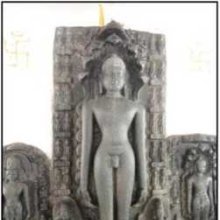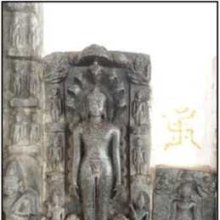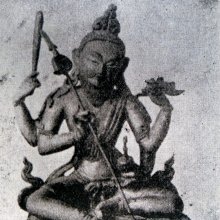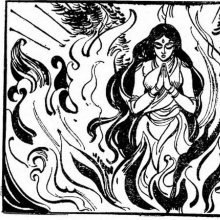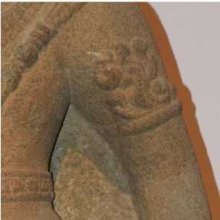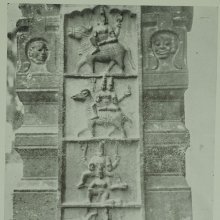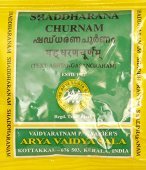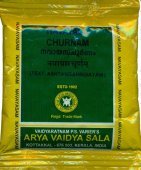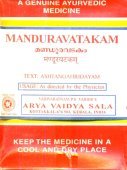Ani, Āṇi, Āni, Aṇi, Ānī, Âni, Aṉi, Āñi, Āṉi: 23 definitions
Introduction:
Ani means something in Hinduism, Sanskrit, Buddhism, Pali, the history of ancient India, Marathi, Jainism, Prakrit, Hindi, biology, Tamil. If you want to know the exact meaning, history, etymology or English translation of this term then check out the descriptions on this page. Add your comment or reference to a book if you want to contribute to this summary article.
Ani has 21 English definitions available.
Images (photo gallery)
(+19 more images available)
Languages of India and abroad
Sanskrit dictionary
[Deutsch Wörterbuch]
Source: Cologne Digital Sanskrit Dictionaries: Böhtlingk and Roth Grosses Petersburger WörterbuchAṇi (अणि):—m. f.
1) Achsennagel [Amarakoṣa 2, 8, 2, 24.] [Trikāṇḍaśeṣa 3, 3, 120.] [Hemacandra’s Abhidhānacintāmaṇi 756.] [Anekārthasaṃgraha 2, 132.] [Medinīkoṣa ṇ. 2.] —
2) Ecke eines Hauses [Trikāṇḍaśeṣa] [Hemacandra’s Abhidhānacintāmaṇi 1013.] [Anekārthasaṃgraha 2, 132.] [Medinīkoṣa] [Śabdakalpadruma] umschreibt aśri, wodurch [Trikāṇḍaśeṣa] [Hemacandra’s Anekārthasaṃgraha] und [Medinīkoṣa] aṇi erklären, mit sūcyādyagrabhāga Spitze einer Nadel u. s. w. [Hemacandra’s Abhidhānacintāmaṇi 1013.] ist offenbar von einem zum Hause gehörigen Dinge die Rede. —
3) Grenze [Trikāṇḍaśeṣa] [Hemacandra’s Anekārthasaṃgraha] [Medinīkoṣa] — Vgl. āṇi und aṇu .
--- OR ---
Aṇī (अणी):—f. = aṇi die Commentatoren zu [Amarakoṣa 2, 8, 2, 24.]
--- OR ---
Āṇi (आणि):—
Source: Cologne Digital Sanskrit Dictionaries: Sanskrit-Wörterbuch in kürzerer FassungAṇi (अणि):—und aṇī m. f. —
1) Achsennagel. —
2) Ecke eines Hauses. —
3) Grenze.
--- OR ---
Āṇi (आणि):—m. und *f. —
1) der in der Nabe laufende Zapfen einer Achse. —
2) *Achsennagel , Lünse. —
3) der unmittelbar über dem Knie liegende Theil des Beines. —
4) *Hausecke. —
5) *Grenze. —
6) *Kampf.
Sanskrit, also spelled संस्कृतम् (saṃskṛtam), is an ancient language of India commonly seen as the grandmother of the Indo-European language family (even English!). Closely allied with Prakrit and Pali, Sanskrit is more exhaustive in both grammar and terms and has the most extensive collection of literature in the world, greatly surpassing its sister-languages Greek and Latin.
See also (Relevant definitions)
Starts with (+1065): Ani dane, Ani Sutta, Ani-ituvanvari, Ani-karuntalai, Ani-kundamani, Ani-nilaimatam, Ani-ottikal, Ania, Anian, Anianeggula, Anias de moras, Aniatik, Aniba coto, Aniba pseudo-coto, Anibaddha, Anibaddhapralapin, Anibaddhavacana, Anibaddhavachana, Anibadha, Anibandhana.
Ends with (+7179): Aanaikundrimani, Ab-pani, Aba-pani, Abadani, Abandani, Abbhakalekhani, Abhavani, Abhayasani, Abhidhamani, Abhidhanachintamani, Abhidhanacintamani, Abhidhanacudamani, Abhidhani, Abhidharthacintamani, Abhiggahani, Abhigrahani, Abhigrihitapani, Abhihani, Abhijani, Abhikkhaṇi.
Full-text (+3958): Agni, Gudabhramsha, Agnivarna, Agnishtoma, Animandavya, Agnikarika, Agnideva, Pavamana, Agnishoma, Bhrashtaguda, Agnikukkuta, Agnishekhara, Analapriya, Pavaka, Agnidamani, Svahapati, Agnijvala, Agninetra, Ahavaniya, Agnavaishnava.
Relevant text
Search found 252 books and stories containing Ani, A-ni, Ā-nī, Aagni, Aani, Agni, Āṇi, Aṇī, Anī, Āṇī, Āni, Aṇi, Ānī, Âni, Aṉi, Āñi, Āṉi; (plurals include: Anis, nis, nīs, Aagnis, Aanis, Agnis, Āṇis, Aṇīs, Anīs, Āṇīs, Ānis, Aṇis, Ānīs, Ânis, Aṉis, Āñis, Āṉis). You can also click to the full overview containing English textual excerpts. Below are direct links for the most relevant articles:
Rig Veda (translation and commentary) (by H. H. Wilson)
Amarakoshodghatana of Kshirasvamin (study) (by A. Yamuna Devi)
Words with special connotations < [Chapter 6 - Grammatical Aspects]
Belief in the presence of evil spirits < [Chapter 4 - Cultural Aspects]
Brahma Sutras (Shankaracharya) (by George Thibaut)
III, 3, 46 < [Third Adhyāya, Third Pāda]
III, 3, 52 < [Third Adhyāya, Third Pāda]
III, 3, 45 < [Third Adhyāya, Third Pāda]
Atharvaveda and Charaka Samhita (by Laxmi Maji)
Grahaṇī (sprue-syndrome) according to Caraka < [Chapter 4 - Diseases and Remedial measures (described in Caraka-saṃhitā)]
Āyurveda and the Vedas < [Chapter 1 - Introduction]
Treatment of Insanity (Unmāda-roga) < [Chapter 3 - Diseases and Remedial measures (described in Atharvaveda)]
Satapatha-brahmana (by Julius Eggeling)
Kāṇḍa VI, adhyāya 2, brāhmaṇa 1 < [Sixth Kāṇḍa]
Kāṇḍa I, adhyāya 3, brāhmaṇa 3 < [First Kāṇḍa]
Kāṇḍa I, adhyāya 6, brāhmaṇa 1 < [First Kāṇḍa]
The Skanda Purana (by G. V. Tagare)
Chapter 22 - The Origin of Viśalyā < [Section 3 - Revā-khaṇḍa]
Chapter 4 - The Origin of Vaiśvānara < [Section 1 - Avantīkṣetra-māhātmya]
Appendix 1 - The story of Skanda’s birth < [Appendices]
Related products
(+21 more products available)
